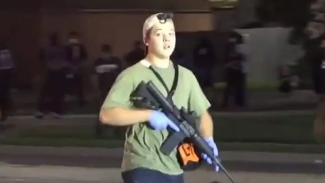
Introduction
Kyle Rittenhouse, a name that became synonymous with the debates surrounding self-defense and social justice, ignited a nationwide conversation following the events of August 2020. As America has grappled with issues related to gun rights, race relations, and protest movements, Rittenhouse’s actions and subsequent trial have significantly shaped perspectives on these critical topics. With the aftermath of his case reverberating through public discourse, understanding its implications is essential for discerning contemporary societal conflicts.
The Incident and Trial
On the night of August 25, 2020, during protests in Kenosha, Wisconsin, sparked by the police shooting of Jacob Blake, Kyle Rittenhouse, then 17 years old, shot three men, killing two and injuring another. Rittenhouse claimed self-defense, arguing that he feared for his life amid the chaos of the protest gone awry. His trial, which began in November 2021, captured nationwide attention, drawing commentary from various social and political commentators regarding gun rights and the justification of self-defense in volatile situations.
In November 2021, after several weeks of emotional testimonies and fierce legal arguments, Rittenhouse was acquitted of all charges. The high-profile outcome of the trial raised questions about the judicial system’s handling of self-defense cases, particularly in the context of race and social justice. Supporters viewed him as a vigilante hero upholding the Second Amendment, while detractors decried his actions as indicative of troubling societal and legal precedents.
Societal Implications
The Rittenhouse case highlighted deep divisions within American society. On one hand, it propounded arguments in favour of gun rights and the interpretation of self-defense laws. On the other hand, it spotlighted the concerning implications of armed civilians participating in protests, particularly regarding racial tensions. Post-acquittal, Rittenhouse has become a polarising figure, often invoked in discussions surrounding gun legislation, military-style weapons in civilian life, and the dynamics of social protest.
Public Reaction and Future Prospects
Since the trial, Rittenhouse has continued to be a controversial figure. His appearances at various events, including speaking engagements aligned with gun rights advocacy groups, have further entrenched the divisions surrounding his case. Many within the communities advocating for social justice view his actions as harmful messaging that emboldens aggressive self-defensive ideologies. Conversely, those in the pro-gun camp regard him as a symbol of rightful self-protection against perceived threats.
Conclusion
As the debate surrounding Kyle Rittenhouse continues, his story will likely be referenced in future discussions regarding gun control and civil liberties in the United States. The complexities he represents serve as a reminder of ongoing societal divides that require careful navigation. For readers, the Rittenhouse saga exemplifies how individual actions can spark broader conversations about morality, rights, and responsibilities in a democracy. This case is bound to influence legislative changes, public opinions, and societal norms in the years to come.
You may also like

Understanding the Current Political Landscape in the UK

The UKIP Party: Recent Developments and Future Outlook

Boris Johnson: A Look at His Current Political Landscape
SEARCH
LAST NEWS
- Remembering Wendy Richard: The Promise to Co-Star Natalie Cassidy
- How Did Anglian Water Achieve an ‘Essentials’ Rating for Mental Health Accessibility?
- Shai Hope Leads West Indies in T20 World Cup Clash Against South Africa
- What We Know About Weston McKennie: Future at Juventus and Past at Leeds
- What We Know About the Upcoming Live Nation Antitrust Trial